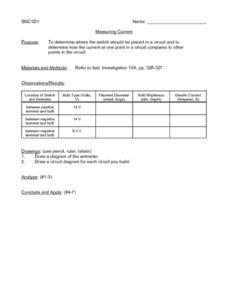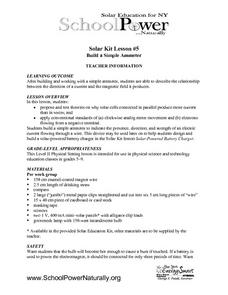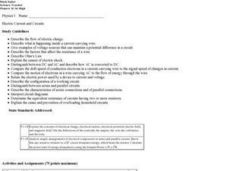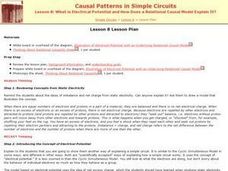Curated OER
Circuits and Conductors
In this electricity worksheet, students examine 6 pictures of electrical circuits attached to a light bulb. They write if the light bulb would be off, glowing dimly, glowing normally, or glowing brightly in each circumstance.
Curated OER
V, R, and I in Parallel Circuit
In this V, R, and I in parallel circuits worksheet, students calculate the total current, total voltage, and total resistance. Students match the correct term with the correct definition. Students also label several diagrams of series...
Curated OER
Measuring Current
In this measuring current instructional activity, students determine where the switch should be placed in a circuit and how the current at one point in a circuit compares to other points in the circuit. Students also draw diagrams of an...
Curated OER
Electricity and Circuits
For this electricity and circuits worksheet, students read a 2 page article, answer 5 questions with multiple choice answers and read 10 statements and determine if they are true or false.
Curated OER
Electricity
In this electricity worksheet, students review electric charges and what types of materials can conduct electricity. This worksheet has 7 fill in the blank, 5 true or false, 3 multiple choice, and 5 short answer questions.
Curated OER
Your Lymphatic System
In this lymphatic system worksheet, students describe whether they think that the lymphatic system is well-adapted to carrying material through the body in comparison to the circulatory system. Then they design a lymphatic system for an...
Curated OER
Resistor-Capacitor Circuits
In this physics worksheet, students determine whether the current flows through the resistor after the switch is closed and explain why. Then they determine whether the capacitor will discharge faster or slower if there is an increase in...
Curated OER
A Short Report on Electricity
In this electricity report worksheet students fold a paper into fourths. One part is the provided title page, the others are for writing facts on electricity.
Curated OER
Circuits & Switches
In this literacy instructional activity, students match the key vocabulary terms based upon the subject of electricity with the definitions found on the right side.
Curated OER
Series/Parallel Circuits
Young scholars engage in a lesson that is concerned with the concept of series and parallel circuits. They conduct research using a variety of resources. They have class discussion and the lesson includes information for the teacher to use.
Curated OER
Electricity: Series and Parallel Circuits
Fourth graders explore electricity and electrical circuits. They explore series and parallel circuits using Christmas lights. Students pull lights out of each strand of lights. They observe the results when the light bulb is pulled out....
Curated OER
Please Turn Up the Lights!
Eighth graders discuss series and parallel circuits and design an investigation to test a hypothesis on total resistance of series and parallel circuits in combination. After discussion, groups design their experiments, run tests, and...
Curated OER
How a Circuit Works
Learners explore the differences between parallel and series circuits by designing and constructing several different circuits. In small groups, they use miniature light bulbs, wires, and nine-volt batteries to build the circuits they...
Curated OER
Electricity
Middle schoolers watch instructor present demonstrations of the basic principles of static electricity, and then conduct some of their own experiments. In small groups, students build simple circuits, using batteries, to try to light up...
Curated OER
Series and Parallel Circuits
Students study simple circuits. After a demonstration of parallel and serial circuit designs, students work in teams to predict the difference between two circuit designs. They build examples of two different circuits and test...
Curated OER
Pickle Juice
Pupils generate experimental questions regarding conductors of electricity, plug cord into pickle, and measure and graph voltage drop across electrodes. Students then compare to variety of other conductors of their choosing.
Curated OER
Build a Simple Ammeter
Students build and work with a simple ammeter to test theories on why solar cells connected in parallel produce more current that in series. Students use the ammeter to indicate the presence, direction, and strength of an electric...
Curated OER
Electric Current and Circuits
Compare the drift speed of conduction electrons in a current-carrying wire to the signal speed of changes in current. They also distinguish between DC and AC and describe how AC is converted to DC.
Curated OER
What is Electrical Potential and How Does a Relational Causal Model Explain It?
Pupils examine models of electrical potential. Students discuss the concept of electrical potential and relational causality. They compare models based on electric potential to those with cyclic simultaneous causality.
Curated OER
What is the Underlying Causality of a Simple Circuit?
Students explore simple circuitry. They compare four models of circuits and explain how each works. Students contrast the cyclic cequential and cyclic simultaneous models using a shower curtain illustration and software simulation.
Curated OER
Changing circuits
Students identify that there are conventional symbols to represent the components in circuits. Students use these symbols to draw diagrams of circuits. They are reminded that electric circuits can be drawn in diagrams using symbols. ...
Curated OER
Ohm's Laws
Learners explore the relationship of resistance, voltage and current in series and parallel circuits. Then they discover Ohm's Law by constructing series circuits with one resistor and putting the resultant resistance, current and...
Curated OER
Conductors, Insulators, and Semiconductors
Middle schoolers will investigate the differences in conductivity of materials, design a variety of complete circuits, and observe the differences between the manner in which light is produced in an incandescent light bulb and an LED.
Curated OER
Bulbs & Batteries Side by Side
Learners build parallel circuits, exploring how they function and looking at their unique features. They describe how current changes when batteries are added in parallel or removed from a parallel arrangement, demonstrate the process of...

























